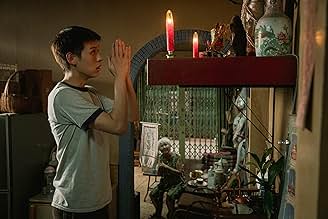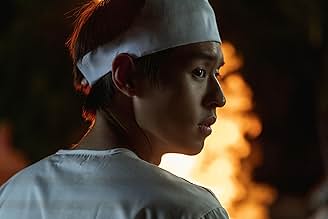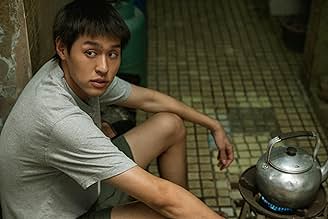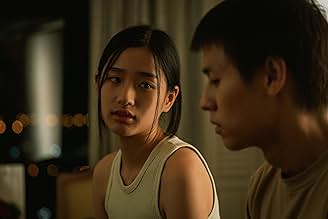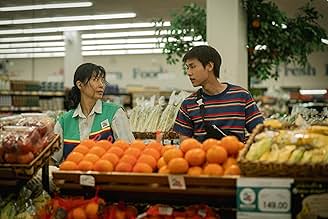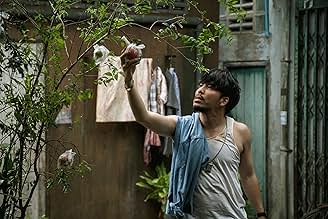Um homem, movido pelo desejo de uma herança multimilionária, começa a cuidar da avó, que está com uma doença terminal. No entanto, ganhar o favor dela não será uma tarefa fácil e ele não é o... Ler tudoUm homem, movido pelo desejo de uma herança multimilionária, começa a cuidar da avó, que está com uma doença terminal. No entanto, ganhar o favor dela não será uma tarefa fácil e ele não é o único que está de olho no dinheiro.Um homem, movido pelo desejo de uma herança multimilionária, começa a cuidar da avó, que está com uma doença terminal. No entanto, ganhar o favor dela não será uma tarefa fácil e ele não é o único que está de olho no dinheiro.
- Direção
- Roteiristas
- Artistas
- Prêmios
- 7 vitórias e 6 indicações no total
Tontawan Tantivejakul
- Mui
- (as Tu Tontawan Tantivejakul)
- Direção
- Roteiristas
- Elenco e equipe completos
- Produção, bilheteria e muito mais no IMDbPro
Avaliações em destaque
Fully aware coming in that it'll be a tearjerker still didn't prepare me for crying so badly that my glasses got foggy & my nose became stuffy.
How to Make Millions Before Grandma Dies (Lahn Mah) offers a simple slice of life story, but just like music, movies tend to be way way better when they resonate with the audience on a personal level. I guess this is why I cried so bad during my viewing in which I also brought my mom. Despite no longer having any grandparents, I still relate so much to the movie as there are so many things which feel like slaps to myself as I don't think I've been a very good son to my parents.
So I presume that those who see this movie will definitely enjoy it more if they could relate with the theme. Go see this movie with your elders, may them be parents or grandparents, hopefully it'll wake something within you.
How to Make Millions Before Grandma Dies (Lahn Mah) offers a simple slice of life story, but just like music, movies tend to be way way better when they resonate with the audience on a personal level. I guess this is why I cried so bad during my viewing in which I also brought my mom. Despite no longer having any grandparents, I still relate so much to the movie as there are so many things which feel like slaps to myself as I don't think I've been a very good son to my parents.
So I presume that those who see this movie will definitely enjoy it more if they could relate with the theme. Go see this movie with your elders, may them be parents or grandparents, hopefully it'll wake something within you.
If you're keen on learning about different cultures, this film offers a fascinating glimpse into Thai traditions and is definitely worth watching.
I'm neither Thai nor Chinese, but I like this movie. You don't have to relate to the story to find this movie interesting, but if you enjoy learning about other cultures, you will likely appreciate it.
It presents a striking contrast between Asian and Western values. In many Asian cultures, there's an expectation for children to inherit from their parents, even if the parents aren't wealthy. In contrast, Western children often strive for independence and aren't as concerned about inheriting their parents' assets if their parents aren't rich.
The film also highlights how Asian cultures tend to prioritize caring for elderly parents over placing them in nursing homes, which is a common practice in the West. The storyline revolves around a grandchild's desire to claim their grandmother's inheritance, and the resolution is compelling as the grandchild ultimately learns that money isn't everything.
Unlike many Thai films that feature beautiful, often Westernized actors or plastic surgery-enhanced faces, this film presents actors who are authentically Thai, with natural performances. The settings are refreshingly unpolished, depicting messy homes and crowded spaces that add to the film's realism rather than the often overly artistic settings of other Asian films.
The film is a drama with a somewhat slow plot, so watching it on Netflix in installments might be more enjoyable to avoid boredom. Overall, it's a poignant exploration of cultural values and family dynamics, offering a genuine portrayal of Thai life.
I'm neither Thai nor Chinese, but I like this movie. You don't have to relate to the story to find this movie interesting, but if you enjoy learning about other cultures, you will likely appreciate it.
It presents a striking contrast between Asian and Western values. In many Asian cultures, there's an expectation for children to inherit from their parents, even if the parents aren't wealthy. In contrast, Western children often strive for independence and aren't as concerned about inheriting their parents' assets if their parents aren't rich.
The film also highlights how Asian cultures tend to prioritize caring for elderly parents over placing them in nursing homes, which is a common practice in the West. The storyline revolves around a grandchild's desire to claim their grandmother's inheritance, and the resolution is compelling as the grandchild ultimately learns that money isn't everything.
Unlike many Thai films that feature beautiful, often Westernized actors or plastic surgery-enhanced faces, this film presents actors who are authentically Thai, with natural performances. The settings are refreshingly unpolished, depicting messy homes and crowded spaces that add to the film's realism rather than the often overly artistic settings of other Asian films.
The film is a drama with a somewhat slow plot, so watching it on Netflix in installments might be more enjoyable to avoid boredom. Overall, it's a poignant exploration of cultural values and family dynamics, offering a genuine portrayal of Thai life.
It has been a while since I cried watching a movie. It depicts the nuances of familial relationships and mortality that I could highly relate to, surprisingly. The development of M's relationship with his grandmother was done beautifully. I enjoyed the quiet moments, the moments where they shared laughter and grew closer. I enjoyed the acting and cinematography so much, as well as the background music that accompanied the scenes. The story was written in such a way that imparted the importance of loving and caring for one's parents and relatives without being pretentious. I really liked the ending and it was nice to see that the whole family visited Ah Ma's grave during Qing Ming.
I'm not Thai, but I watched this film in a Bangkok cinema with English subtitles.
I thought it was a comedy about everyone fighting for their grandma's fortune, but it ended up being an honest portrait of a family's journey through the death of a dying grandmother. Discovering differing dynamics of each sibling and the choices parents have to make to make sure their kids are well looked after long after their passing. The core subject is so relatable that it just awakens your heart and soul. There was no dry eye in the room, and I walked out, wanting to call my parents immediately. Could you bring a box of tissues when you see it?
I thought it was a comedy about everyone fighting for their grandma's fortune, but it ended up being an honest portrait of a family's journey through the death of a dying grandmother. Discovering differing dynamics of each sibling and the choices parents have to make to make sure their kids are well looked after long after their passing. The core subject is so relatable that it just awakens your heart and soul. There was no dry eye in the room, and I walked out, wanting to call my parents immediately. Could you bring a box of tissues when you see it?
No matter how much you try to hold back the tears, it's likely that wall will crumble at the ending, set against the backdrop of a pickup truck delivering a farewell so beautifully. A question arises while watching that scene. Are the tears falling because the film is well-made, or simply because viewers (myself included) immediately relate the events on screen to personal memories?
The answer is "both." How to Make Millions Before Grandma Dies feels relatable because it deeply understands family dynamics, especially in Asian families. How inheritance can erase affection, how gathering at grandma's house is a warm moment always anticipated, how the grandma eagerly awaits the arrival of her children and grandchildren while wearing her best clothes, and how the loneliness after togetherness feels so piercing, especially for the elderly living alone. The memories of all those moments together are the truly valuable legacy.
The answer is "both." How to Make Millions Before Grandma Dies feels relatable because it deeply understands family dynamics, especially in Asian families. How inheritance can erase affection, how gathering at grandma's house is a warm moment always anticipated, how the grandma eagerly awaits the arrival of her children and grandchildren while wearing her best clothes, and how the loneliness after togetherness feels so piercing, especially for the elderly living alone. The memories of all those moments together are the truly valuable legacy.
Você sabia?
- CuriosidadesThis is actually the film debut of Usa Semkhum, a 78-year-old housewife, who plays the role of Grandma Meng Ju.
- Cenas durante ou pós-créditosThe credits don't start until the 12-minute mark.
- Trilhas sonorasEver-Forever
Written by Jaitep Raroengjai
Sung by Puttiphong Assanatnakul
Principais escolhas
Faça login para avaliar e ver a lista de recomendações personalizadas
Detalhes
Bilheteria
- Faturamento bruto nos EUA e Canadá
- US$ 303.772
- Fim de semana de estreia nos EUA e Canadá
- US$ 115.457
- 15 de set. de 2024
- Faturamento bruto mundial
- US$ 5.952.771
- Tempo de duração
- 2 h 5 min(125 min)
- Cor
- Mixagem de som
- Proporção
- 1.85 : 1
Contribua para esta página
Sugerir uma alteração ou adicionar conteúdo ausente





